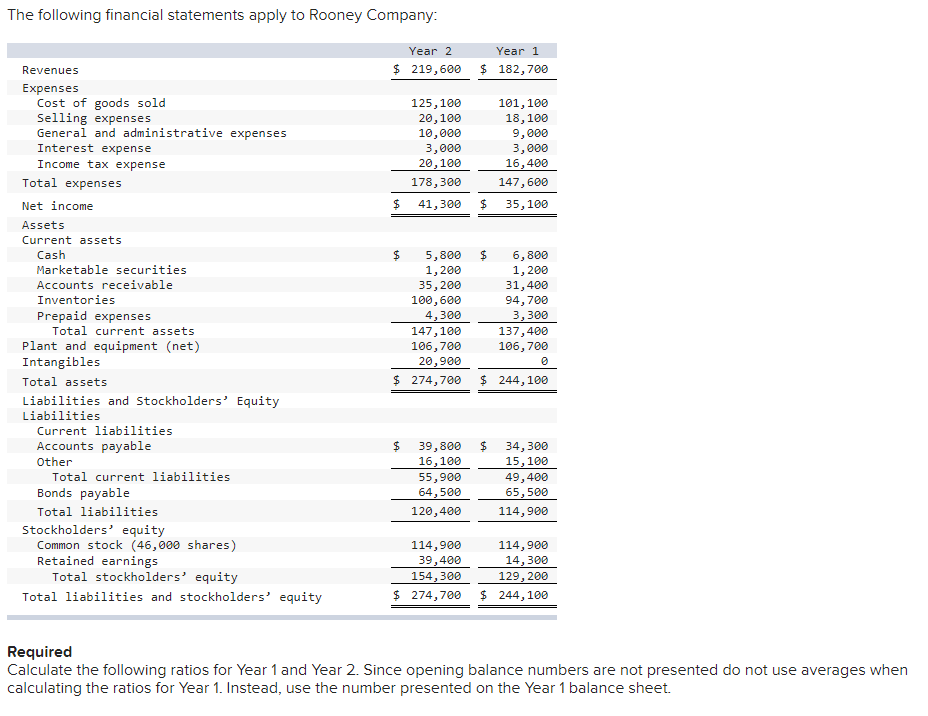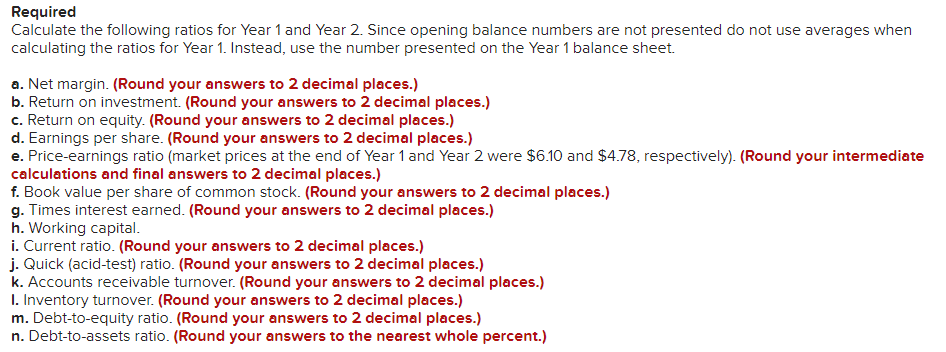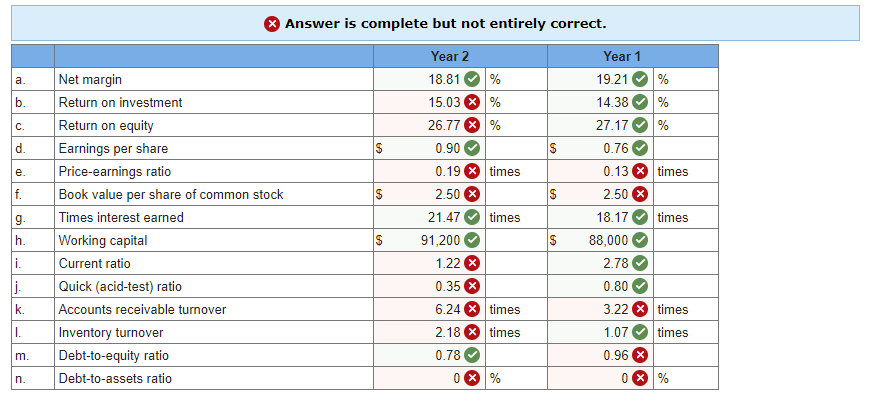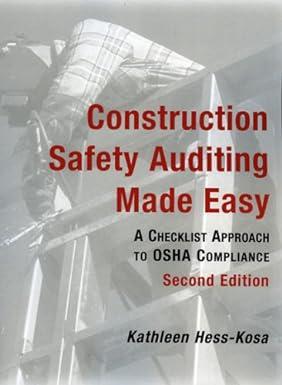Answered step by step
Verified Expert Solution
Question
1 Approved Answer
Not sure why some of the answers are incorrect, please help. The following financial statements apply to Rooney Company: requirea Calculate the following ratios for
Not sure why some of the answers are incorrect, please help.


 The following financial statements apply to Rooney Company: requirea Calculate the following ratios for Year 1 and Year 2. Since opening balance numbers are not presented do not use averages when calculating the ratios for Year 1. Instead, use the number presented on the Year 1 balance sheet. Calculate the following ratios for Year 1 and Year 2 . Since opening balance numbers are not presented do not use averages when calculating the ratios for Year 1. Instead, use the number presented on the Year 1 balance sheet. a. Net margin. (Round your answers to 2 decimal places.) b. Return on investment. (Round your answers to 2 decimal places.) c. Return on equity. (Round your answers to 2 decimal places.) d. Earnings per share. (Round your answers to 2 decimal places.) e. Price-earnings ratio (market prices at the end of Year 1 and Year 2 were $6.10 and $4.78, respectively). (Round your intermediate calculations and final answers to 2 decimal places.) f. Book value per share of common stock. (Round your answers to 2 decimal places.) g. Times interest earned. (Round your answers to 2 decimal places.) h. Working capital. i. Current ratio. (Round your answers to 2 decimal places.) j. Quick (acid-test) ratio. (Round your answers to 2 decimal places.) k. Accounts receivable turnover. (Round your answers to 2 decimal places.) I. Inventory turnover. (Round your answers to 2 decimal places.) m. Debt-to-equity ratio. (Round your answers to 2 decimal places.) n. Debt-to-assets ratio. (Round your answers to the nearest whole percent.) Answer is complete but not entirely correct. The following financial statements apply to Rooney Company: requirea Calculate the following ratios for Year 1 and Year 2. Since opening balance numbers are not presented do not use averages when calculating the ratios for Year 1. Instead, use the number presented on the Year 1 balance sheet. Calculate the following ratios for Year 1 and Year 2 . Since opening balance numbers are not presented do not use averages when calculating the ratios for Year 1. Instead, use the number presented on the Year 1 balance sheet. a. Net margin. (Round your answers to 2 decimal places.) b. Return on investment. (Round your answers to 2 decimal places.) c. Return on equity. (Round your answers to 2 decimal places.) d. Earnings per share. (Round your answers to 2 decimal places.) e. Price-earnings ratio (market prices at the end of Year 1 and Year 2 were $6.10 and $4.78, respectively). (Round your intermediate calculations and final answers to 2 decimal places.) f. Book value per share of common stock. (Round your answers to 2 decimal places.) g. Times interest earned. (Round your answers to 2 decimal places.) h. Working capital. i. Current ratio. (Round your answers to 2 decimal places.) j. Quick (acid-test) ratio. (Round your answers to 2 decimal places.) k. Accounts receivable turnover. (Round your answers to 2 decimal places.) I. Inventory turnover. (Round your answers to 2 decimal places.) m. Debt-to-equity ratio. (Round your answers to 2 decimal places.) n. Debt-to-assets ratio. (Round your answers to the nearest whole percent.) Answer is complete but not entirely correct
The following financial statements apply to Rooney Company: requirea Calculate the following ratios for Year 1 and Year 2. Since opening balance numbers are not presented do not use averages when calculating the ratios for Year 1. Instead, use the number presented on the Year 1 balance sheet. Calculate the following ratios for Year 1 and Year 2 . Since opening balance numbers are not presented do not use averages when calculating the ratios for Year 1. Instead, use the number presented on the Year 1 balance sheet. a. Net margin. (Round your answers to 2 decimal places.) b. Return on investment. (Round your answers to 2 decimal places.) c. Return on equity. (Round your answers to 2 decimal places.) d. Earnings per share. (Round your answers to 2 decimal places.) e. Price-earnings ratio (market prices at the end of Year 1 and Year 2 were $6.10 and $4.78, respectively). (Round your intermediate calculations and final answers to 2 decimal places.) f. Book value per share of common stock. (Round your answers to 2 decimal places.) g. Times interest earned. (Round your answers to 2 decimal places.) h. Working capital. i. Current ratio. (Round your answers to 2 decimal places.) j. Quick (acid-test) ratio. (Round your answers to 2 decimal places.) k. Accounts receivable turnover. (Round your answers to 2 decimal places.) I. Inventory turnover. (Round your answers to 2 decimal places.) m. Debt-to-equity ratio. (Round your answers to 2 decimal places.) n. Debt-to-assets ratio. (Round your answers to the nearest whole percent.) Answer is complete but not entirely correct. The following financial statements apply to Rooney Company: requirea Calculate the following ratios for Year 1 and Year 2. Since opening balance numbers are not presented do not use averages when calculating the ratios for Year 1. Instead, use the number presented on the Year 1 balance sheet. Calculate the following ratios for Year 1 and Year 2 . Since opening balance numbers are not presented do not use averages when calculating the ratios for Year 1. Instead, use the number presented on the Year 1 balance sheet. a. Net margin. (Round your answers to 2 decimal places.) b. Return on investment. (Round your answers to 2 decimal places.) c. Return on equity. (Round your answers to 2 decimal places.) d. Earnings per share. (Round your answers to 2 decimal places.) e. Price-earnings ratio (market prices at the end of Year 1 and Year 2 were $6.10 and $4.78, respectively). (Round your intermediate calculations and final answers to 2 decimal places.) f. Book value per share of common stock. (Round your answers to 2 decimal places.) g. Times interest earned. (Round your answers to 2 decimal places.) h. Working capital. i. Current ratio. (Round your answers to 2 decimal places.) j. Quick (acid-test) ratio. (Round your answers to 2 decimal places.) k. Accounts receivable turnover. (Round your answers to 2 decimal places.) I. Inventory turnover. (Round your answers to 2 decimal places.) m. Debt-to-equity ratio. (Round your answers to 2 decimal places.) n. Debt-to-assets ratio. (Round your answers to the nearest whole percent.) Answer is complete but not entirely correct Step by Step Solution
There are 3 Steps involved in it
Step: 1

Get Instant Access to Expert-Tailored Solutions
See step-by-step solutions with expert insights and AI powered tools for academic success
Step: 2

Step: 3

Ace Your Homework with AI
Get the answers you need in no time with our AI-driven, step-by-step assistance
Get Started


